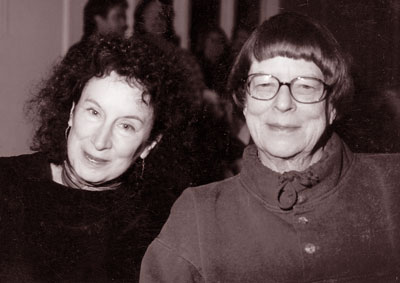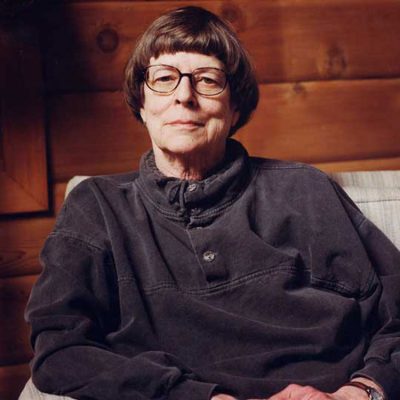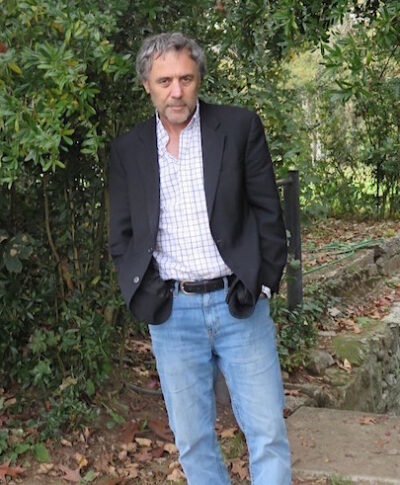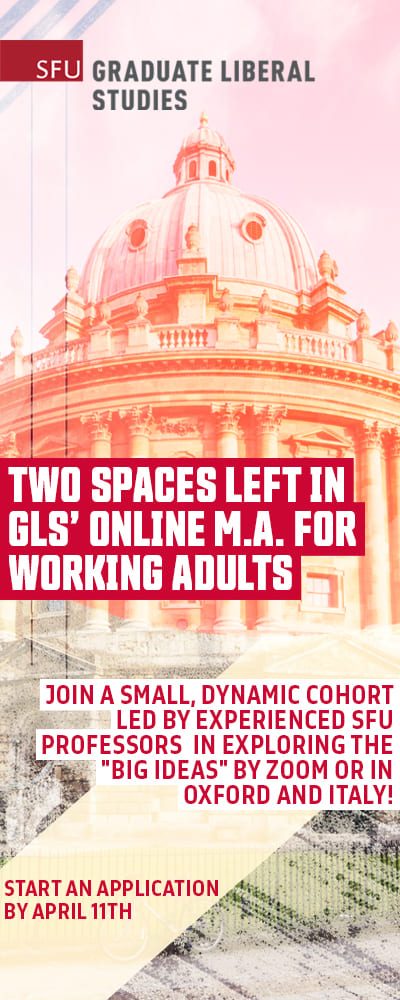#82 Jane’s ruling aphorisms
A Queer Love Story: The Letters of Jane Rule and Rick Bebout
by Marilyn R. Schuster (editor)
Vancouver: UBC Press, 2017
$50 / 9780774835435
Reviewed by Alan Twigg
First published Feb. 7, 2017
*
“I hope I’m remembered for being lusty, feisty and full of life.”
— Jane Rule
People who knew Jane Rule are still saying to themselves, “I wonder what Jane would think of this.”
Jinx, as some friends called her, has been dubbed “the greatest lesbian writer of our generation” because the six-foot-tall, American-born, Galiano Islander wrote Desert of the Heart, a 1964 novel that dared to describe a lesbian couple succeeding in a long-term relationship.”

But Jane Rule was much more. She lent so much money to her fellow islanders, so often, that she earned a different nickname “The Bank of Galiano.” For years, when she and her lifelong partner Helen Sonthoff shared their pool with teens and toddlers, it was Rule was the lifeguard who taught kids to swim. And she was hilariously funny. More importantly, she should be revered as an iconoclastic social philosopher who was just as interested in children and the elderly as she was in gay pride and civil rights.
Jane Rule’s wisdom is the best reason to wade through the misleadingly-titled A Queer Love Story: The Letters of Jane Rule and Rick Bebout, a 650-page, overdue omnibus edited by Marilyn R. Schuster that records the eight-year correspondence between North America’s foremost “public lesbian” and her editor at the Toronto-based publication, Body Politics. Bebout’s descriptions of his sex life, the scourge of AIDS and the emergence of gay culture constitute two-thirds of the text, but it’s Rule’s sanity that shines.
“The letters in A Queer Love Story,” according to B.C. author Michael V. Smith, “are not simply a look into private lives, which are satisfying and rich in themselves. Here are two powerhouses influencing Canadian history. They helped make our queer history — one word, one gesture, one fight at a time. I felt waves and waves of gratitude, both for the work these two heroes performed and for the chance to see it documented, to be welcomed into that past. This book will remind you just how deeply personal are our political struggles.”
Bebout’s very personal letters are largely concerned with the gay rights movement to which he devoted his journalism career, but characterizing Rule’s moral and intellectual concerns as being primarily concerned with queer history undervalues her much broader concerns.
Here is a sampling of Rule’s private comments.
“If I were given an opportunity to censor, I would ban all violence against women, but I would ban all violence against men as well, and that would pretty well shut down the entertainment industry. And the wife beating, child abuse, beating up of men, and war would still go on.”
“I do think the accusation that the gay community isn’t sympathetic about children is probably a just one, though I think it’s not a problem limited to the gay community. A lot of heterosexuals who don’t have children or whose children are grown aren’t interested in having children around.”
“There is a simple point about any sort of sexual experimenting: it should be done between consenting people, the dangers as well-known as those for mountain climbing, skiing, joining the Peace Corps or voting for Reagan. And I think we should be talking as much or more about love, friendship, community.”
“I never liked mortgages either or time payments on cars, being debt to the future. I like being responsible for the present; that seems to me enough.”

“I do think it bizarre that we are taught to honor those who die in battle, condemn those who die of pleasure. We early memorize, in the States anyway, “I regret I have but one life to give to my country.” He didn’t give his life. He gave his death. Giving birth is giving life. There is something basically peculiar about the idea of “dying for other people.” Is there in it a male attempt to equal or transcend the power of giving birth? If only women can do it in this life, only a man can do it for the next? If dying isn’t a punishment, it certainly isn’t a virtue either. I really do want a morality focused on life rather than death.
“Not mentioning incest is one of the ways we keep it from going away.”
“I was very much in love with several women before I met Helen, one of whom I might have lived quite happily with if it hadn’t been for her terror at my need for candour.”
“I think most of my characters come to me as voices, I don’t mean in any spooky way, but my head does run in sentences more often than in images, a sort of stream of consciousness language that is there most of the time, if I bother to listen to it.”
“Most sexual energy directed toward me now I find simply wearying. I’m sure that importantly has to do with a frail back, aging bones, limited energy, but there’s something else about it, too, a sense that the sexual energy is directed at my work rather than at me or anyway at the legend I am. As such it seems to be not only spurious but dangerous not for me so much as for the other person involved. One of the reasons I don’t give readings or lecture is that I don’t like the kind of energy that comes at me in those circumstances, but it is harder and harder for me to be a person among other people: personal. I increasingly therefore, turn my “abnormal attention” and need for energy in other directions, to the children I teach to swim (no, don’t report me), to neighbours in need, to the amazing and fragile old. The defused eroticism I feel in all relationships nourishes me now more than those which require direct sexual acknowledgement. And I feel no loss at all.”
“I can never think why anyone would be interested in reading a book I’ve just finished. It loses its vitality for me, I suppose, once my imagination is unhooked from it.”
“Virginia Woolf killed herself on my birthday. I’ve never liked that. I’ve never liked, more importantly, the fixation on her suicide when she had lived to nearly 62, a hardworking, often wonderful life against hard odds.”
“I try to figure out why the idea of my own death doesn’t trouble me. I think I have found life hard enough, demanding enough, to think of death as a sort of reward, rest anyway.”
*

Alan Twigg is the publisher of BC BookLook and BC Bookworld in Vancouver. From 2016-2019 he was publisher of The Ormsby Review.
*
The Ormsby Review. More Books. More Reviews. More Often.
Publisher and Editor: Richard Mackie
The Ormsby Review is a journal service for in-depth coverage of B.C. books and authors. The Advisory Board consists of Jean Barman, Robin Fisher, Cole Harris, Wade Davis, Hugh Johnston, Patricia Roy, David Stouck, and Graeme Wynn. Scholarly Patron: SFU Graduate Liberal Studies. Honorary Patron: Yosef Wosk. Provincial Government Patron since September 2018: Creative BC
“Only connect.” – E.M. Forster






























